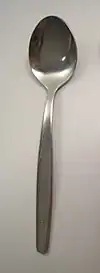colher
Portuguese
Etymology 1

colher
From Old Galician-Portuguese cullar, collar, from Latin cochleārem (“spoon”). The Old Portuguese word was influenced by Old French cuiller (French cuiller / cuillère), from the same Latin root. Cognate with Galician culler, French cuillère, Spanish cuchara, Catalan cullera. Compare with caracol (“snail”).
Pronunciation
- (Brazil) IPA(key): /koˈʎɛʁ/ [koˈʎɛh]
- (São Paulo) IPA(key): /koˈʎɛɾ/
- (Rio de Janeiro) IPA(key): /koˈʎɛʁ/ [koˈʎɛχ]
- (Southern Brazil) IPA(key): /koˈʎɛɻ/
- (Portugal) IPA(key): /kuˈʎɛɾ/
- Hyphenation: co‧lher
Derived terms
Descendants
- Kabuverdianu: kudjer
Etymology 2
Inherited from Old Galician-Portuguese colher, from Latin colligere (“to collect, to gather”). Compare also the borrowed doublets coligir and coligar. Cognate with Galician coller, Asturian coyer, and Spanish coger.
Pronunciation
- (Brazil) IPA(key): /koˈʎe(ʁ)/ [koˈʎe(h)]
- (São Paulo) IPA(key): /koˈʎe(ɾ)/
- (Rio de Janeiro) IPA(key): /koˈʎe(ʁ)/ [koˈʎe(χ)]
- (Southern Brazil) IPA(key): /koˈʎe(ɻ)/
- (Portugal) IPA(key): /kuˈʎeɾ/
- Hyphenation: co‧lher
Verb
colher (first-person singular present colho, first-person singular preterite colhi, past participle colhido)
Conjugation
Conjugation of colher (See Appendix:Portuguese verbs)
This article is issued from Wiktionary. The text is licensed under Creative Commons - Attribution - Sharealike. Additional terms may apply for the media files.